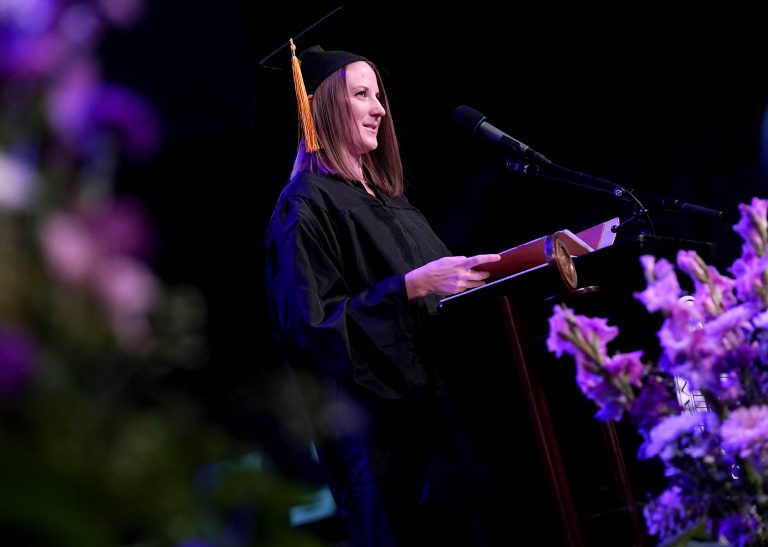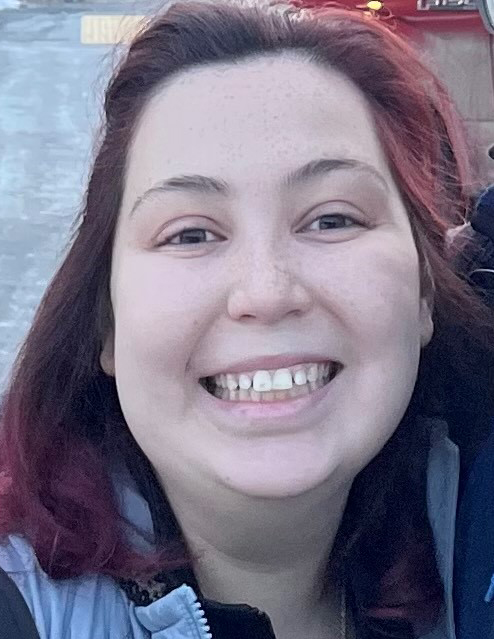EDITOR’S NOTE: This story is reprinted from the August issue of GCU Magazine. To read the digital version of the magazine, click here.
Anus Ellie Garrison left teaching to raise her son, she began noticing big social changes.
Many people that she knew had “mental hang-ups,” she said.
“When my dear friend passed away from it, I realized that there has got to be something done about this,” Garrison said. “She passed away after a long battle with anorexia, and it wasn’t until the final stages where she sought mental health counseling, but at that point her body was too far gone. She was like a sister to me. Her passing away was an absolute devastation.
“A month later, my former workplace was a victim to a school shooting. There were bullet holes in my old classroom.”
After three died in a 2017 mass shooting at her former school in New Mexico – Aztec High School – Garrison had seen enough.
 Ellie Garrison told the Spring Commencement audience that care is “simply woven into you.”
Ellie Garrison told the Spring Commencement audience that care is “simply woven into you.”
“Watching myself, my community be impacted by mental health, I needed to follow what I was feeling called to, and those were definite signifiers in my life that this was a real big need,” she said.
Garrison enrolled at Grand Canyon University a few months later to pursue a master’s in clinical mental health counseling.
GCU has responded to the burgeoning societal need for more mental health counseling, especially after a pandemic, to become a national leader in graduate counseling programs. A recent OnlineU analysis showed that GCU had the most graduate mental health counseling degree conferrals in the nation in 2020 (1,135) and 72.8% growth from 2016 to 2020, which garnered attention from Clinical Times.
dr Sherman Elliot, Dean of the College of Humanities and Social Sciences, told the health care publication that GCU has been successful because it is intentional about meeting the global mental health crisis with online education. The University uses technology to engage students daily, helping them form a counselor identity and preparing them for specific requirements in all 50 states.
GCU fit for Garrison, who was raising a young son while living in a rural area of Farmington, New Mexico, and could
arrange her schedule to study and attend online class, work part time and care for her child while in-laws helped, too.
“They understand the importance of it, the need in the community,” Garrison said.
An American Psychological Association 2021 practitioner survey showed steep increases in demand for anxiety and depression treatment.
The pandemic was raging, and Garrison said she was lucky to have dr Anna Johnson, “who we lovingly called Dr. J,” shepherding the class through the challenges with structure and emotional support.
It’s important work.
“There was already a crisis in mental health, especially with those age 15 to 25. COVID hit and exacerbated the mental health crisis that already exists,” said dr Anna EdgestonCounseling Program Director.
It’s felt in schools, and GCU’s graduate school counseling program is also meeting that shortage. After the school shooting in Uvalde, Texas, last spring, the school counselors she works with across the country said students came to their offices frightened.
Care, or what you care about, is not a feeling. It’s simply woven into you.”
Ellie Garrison
“One of the big concerns, not just in the school system, is that there is a social and spiritual void that we need to fill,” said dr Kimberly Grigg, Program Chair of School Counseling. “In the past it was met with families. Now so much has changed, and that void is definitely felt.”
That’s why many students come to GCU, Edgeston added. Its program’s Christian worldview gives students freedom to talk about how to incorporate it for themselves, students and clients.
“We think when we are going to a graduate school we are learning these skills, but what we are doing is learning about ourselves,” she said.
It opens up exploration of their own views and others, “so when they get out into the field there is this sense of compassion, humility and these values that come from this worldview that doesn’t even have to be preached.”
Other reasons for GCU’s growth, Grigg believes, are its data-informed program modifications, technological proficiency for courses, and community-building, such as voluntary Zoom “coffee chats” that connect
students during online learning.
associate professor dr Elliot Isom said it’s the time he can spend working with counseling students without numerous expectations outside teaching. He knows those students are vital to fill shortages.
“It showcases the University’s desire to be of service, not just in the state of Arizona but the nation,” he said.
 Emily Gerlach
Emily Gerlach
Emily Gerlach enrolled in April at GCU to seek a master’s in clinical mental health counseling with an emphasis in trauma while acting as a direct care worker at a nonprofit facility for foster children in San Antonio. She was surprised that an online education could be filled with so much meaningful discussion.
“A lot of it is situation based, which is a lot more relevant in counseling. It’s not all black and white, it’s a lot of shades of gray,” she said.
Gerlach sees the immense need all around her and hopes to start a nonprofit for foster children after earning her master’s.
“This has been an ongoing problem for years. But I see it in the people I’m around – my family, friends, people at the grocery store – that we are so much more vulnerable with the advent of social media,” she said. “We as humans are getting meaner because we have this opportunity to say things we wouldn’t say to their face.”
She wants to help ease the trauma.
Garrison is convinced that GCU is the place to focus that calling. She graduated in April and said this as a Commencement speaker: “Care, or what you care about, isn’t a feeling. It’s simply woven into you. You were designed with it in your heart, and it serves as part of God’s invitation to you to participate in His plan for human flourishing. This is a staggeringly beautiful truth.”
Grand Canyon University senior writer Mike Kilen can be reached at [email protected] or at 602-639-6764.
***
Related content:
GCU News: School counseling ‘pioneers’ on path to aid students
GCU News: Advocacy and counseling go hand in hand
Comments are closed.